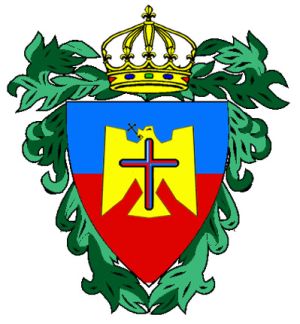Gheorghe Milţeanu
| Portrait | |
| Title: | Commander in Chief/Chancellor/King of Muntenia |
| Predecessor: | Constantin I |
| Successor: | Elena I |
| Birth: | 1914 |
| Death: | 1990? |
| Profession: | Dictator |
| Political Party: | SNOR |
| Relgious Affiliation: | Romanian Orthodox |
| Family | Wife |
| Personal Arms |
With the advent of SNOR, life in Muntenia continued much as before for nearly two decades, until in 1967 a new leader rose to power. Gheorghe Milţeanu was relatively unknown to most, and of those who did know him, few could expect his brutality to the lives of Muntenian people. Milţeanu made grandiose speeches where he declared "a new era had come for Muntenia" and he promised a great future, when the Muntenian eagle would once more fly proudly.
During his first years in power, Milţeanu was considered rather popular. Many held hopes he would end those dark years that had come with SNORism, changing them into something better. For a time it seemed like the situation in the country was improving. Milţeanu's stated ambitions of making Muntenia his glorious nation, stronger than it had ever been historically were manifest in the huge resources he placed in industry, and in plans for many extraordinary projects that would show the world just how grand Muntenia really was. Not everybody liked what Milţeanu was doing however, and many saw him as a threat to their own interests, others were not all convinced of his grandiose plans.
As time progressed and dissent grew, Milţeanu responded by removing all those who failed to support his drive for power and progress. He introduced a new security police organization, the Securitate, to maintain order and keep control, preventing conflict and dissent. This security force would soon come to be dreaded for its extreme methods, and the extensive informant network it engendered, hiring people to tell on others. Thus, nobody in Muntenia could ever feel safe. Infamous working camps were established for those who ran afoul of the dictator, even for the smallest of reasons.
The Turkish minority in the east and the Bulgarian minority in the southwest were struck particularly hard. Milţeanu had explicitly declared that the only official language of Muntenia was Romanian and no other language were to be used in schools, universities, governmental institutions or any other public service. Turks and Bulgarians were often sent to working camps without apparent reason, and often faced deliberate discrimination from authorities. Many historians consider this to be a precursor to ethnic cleansing that could have, but grateful didn't happen.
Milţeanu developed an ever growing belief in his own greatness and began ever more daring projects to develop Muntenia into the supernation he wanted to see. Central to this was eliminating the king. Though he was a figurehead without any political power, Milţeanu couldn't stand to see anyone as head of state beside himself. In 1973 he forced the king from the throne, going so far as to crown himself as King Gheorghe I. The former king, Constantin fled the country within the month in fear of his life with his family and any government officials aligned to him.
In Milţeanu's opinion any capital with class should have its own river. While Bucureşti had waters flowing near it, but not through the center of the city, he engineered public works to recreate waterways similar to those of major European cities, damming and redirecting the waters of the Dâmboviţa to flow straight through the city centre. Further on, he argued that any great kingdom should have it's great castle, so in 1981 he ordered the construction of a magnificent castle in the northern outskirts of Bucureşti. This colossal project would turn out so demanding that even at the end on SNORism in 1990, construction was still in progress.
Due nearly completely to his overambitious projects and lavlishly wasteful uses of resources, Milţeanu found his country in massive debt. Desperate to do something about it, he decreed that almost everything was produced in the country was to be shipped abroad, leading to extensive shortages and a starving population. This further turned the population against him, but because of the Securitate, Milţeanu's rule of terror remained secure, the suffering people becoming increasingly desperate while Milţeanu and his wife lived a life of excess in their castle. To stem the worsening perception throughout the nation that things were increasingly dire, Milţeanu pushed the official propaganda machine to continue reporting that things were improving, that Muntenia was advancing as an increasingly powerful nation, respected more than ever before.
In 1989 as the pall of SNORism began slipping from the nations of Europe, Milţeanu tried desperately to stay in power. He began by forbidding news of overthrown SNORist regimes in state controlled media, and propaganda continued just as before. This plan did not hold for long, as the people in western Muntenia could receive Serbian television and it did not take long until the events of other nations triggered a massive revolt against Milţeanu, initially started by a Bulgarian priest called Vladimir Goleminov who encouraged the people gathered in his church in Craiova to stand up against Milţeanu and the SNORists.
The army was called in when local police could not handle the situation. To Milţeanu's great misfortune, his own army soon turned against him and the movement begin spreading. Given his heavy-handed rule, the dissatisfaction among the people was strong and the revolt quickly spread towards the capital. In the final battles betweeen the pro-SNORist forces and the rebels the whereabouts of the Milţeanus became confused, and though the search for them continued for months in an official government capacity, and to this day by bounty-hunters and fanatical devotees, they seem to have disappeared without a trace, and no lead in their disappearances proceed beyond speculation.
| Preceded by: Constantin |
King of Muntenia 1973-1990 |
Succeeded by: Elena I |

